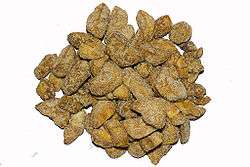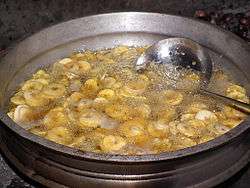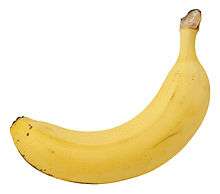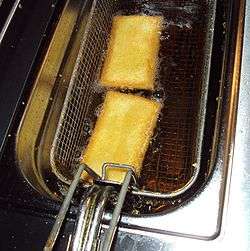Banana chip




Banana chips are deep-fried or dried slices of bananas (fruits of herbaceous plants of the genus Musa of the soft, sweet "dessert banana" variety). They can be covered with sugar or honey and have a sweet taste, or they can be fried in oil and spices and have a salty or spicy taste.[1] Banana chips are commonly found in India and Indonesia (as kripik). Variants of banana chips may be covered with chocolate instead. Banana chips are similar to chifle, usually made from firmer, starchier fruit varieties of the genus Musa commercially called plantains or "cooking bananas".
Fried
Fried banana chips are usually produced from under-ripe banana slices deep-fried in sunflower oil or coconut oil. These chips are dry (like potato chips) and can be salted, spiced, sugar coated or jaggery coated. If ripe bananas are used, they come out oily. They are used for desserts, not for dry chips.
Dried
Some varieties of banana chips can be produced using only food dehydration. Banana slices that are only dehydrated are not dark yellow and crunchy, but rather are brown, leathery and chewy. They are very sweet and have an intense banana flavor. These are ideally made from bananas that are fully ripe.
Another kind is made by baking in an oven, although this process may not result in the same intense banana flavor.
Benefit
Banana chips are made by deep-frying or drying banana slices. Dried banana chips, in turn, contain mostly all vitamins and minerals found in fresh banana fruits. However, the biggest amount of health-boosting nutrients are found in fresh banana fruits.
Fiber
Fiber can maintain your healthy digestive system which can lower chance to get constipation.[2] Fiber also can reduce blood cholesterol and manage blood sugar levels which can lead to heart disease and type2 diabetes. Some disease such as cardiovascular and some cancer can be anticipated by eating fiber. Usually, 1-ounce of banana chips contain 2.2 grams of fiber compared with a fresh banana which contains 3.1 grams of fiber.[3] This makes a fresh banana a healthier option.
Iron
Iron is one of the essential minerals that is used to form hemoglobin and myoglobin. They are the two proteins that serve your tissues with a new and fresh amount of oxygen. Iron also stimulates enzymes that metabolism needed to execute the chemical reactions to form energy. 1.4 milligrams of iron are contained in a four-ounce serving of banana chips. This equals roughly 18% of the everyday iron demand for men or 8% for women, according to the Linus Pauling Institute.[2]
Potassium
Although potassium is an important mineral, a fresh banana which contains 422 milligrams has much more Potassium than the banana chip which contains only 152 milligrams.[3] Potassium and other minerals like sodium manage your blood pressure level.[2] This mineral maintains a normal heartbeat and muscle function. It also improves your digestive system and skeleton.[3]
Vitamins
Banana is a great source of vitamins A, B6, C and D. Vitamin A promotes many benefits like healthy teeth, bones and soft tissues. Vitamin B6 aids immune system, heart and brain health. Indeed, B6 vitamin is needed for the proper development and functioning of the brain. Vitamin C boots healing, growth of tissue and ligament and increases the amount of the iron body absorption from plant sources. As antioxidant, vitamin C can help to prevent the appearance of some cancers, cardiovascular diseases and various chronic diseases. Finally Vitamin D is also very important for normal growth and development of bones and teeth by helping the body to absorb calcium.[4]
Manganese
Manganese is a mineral nutrient which promotes healthy bone structure and bone metabolism by helping to create essential enzymes for building bones. It is also a co-enzyme which assist many metabolic activity in the human body. In addition, Manganese helps the formation of connective tissues, absorption of calcium, regulation of blood sugar level, and metabolism of fats and carbohydrates.
Uses and variations
India
Fried plantain chips, usually made in the Indian states of Kerala and Tamil Nadu, and known locally as nenthra-kaaya oopperi or upperi in Kerala, are fried in coconut oil.[5] Both ripe and unripe plantains are used for this variant. Sometimes they are coated with masala or jaggery to form spicy and sweet variants. Almost plain banana and platain chips are called pachkkaya varuthathu and kaya upperi respectively;[6] sweet jaggery-banana chips are called sharkara upperi. It is an integral part of the traditional Kerala meal called sadya served during weddings and traditional festivals such as Onam.
Indonesia
Banana is a native plant of Maritime Southeast Asia and the people of the archipelago has developed many uses of it for ages, including as a snack. In Indonesia, banana chip is called kripik pisang, and is considered as a variant of crispy kripik (traditional chip or crisp). Kripik pisang is a popular crispy snack and can be commonly found in Indonesia, although it seems to be more prevalent in Java and Sumatra. Usually unripe green bananas are thinly sliced, soaked in lime and salt water solution, and being deep fried as chips.[7] Unripe banana is well suited for deep frying due to its low content of water and sugar, while having high starch content. Pisang goreng is another fried banana snack, although it is not thinly slices and serves as a sweet hot snack.
Latin America
The chips are often part of muesli and nut mixes.
Other chips, such as patacones, are salty.
Similar chips called chifle are made from plantains, the family of fruit that bananas come from. In tropical Latin American cultures, all bananas are considered plantains, but not all plantains are bananas. These deep-fried plantain chips are also quite popular in the southeastern part of Mexico, especially in the state of Tabasco.
See also
- Apple chips
- Banana - In popular culture and commerce, "banana" usually refers to soft, sweet "dessert" Musa cultivars.
- Banana powder
- Chifle - a similar salty snack chip made from plantains.
- Plantain - Musa cultivars with firmer, starchier fruit
- Tostones - a similar salty snack made from plantains.
- Kripik - Indonesian chips, kripik pisang is Indonesian banana chips
- List of deep fried foods
- List of dried foods
References
- ↑ Food processing, EPa. "How to Make Sweet and Salted Banana Chips". Retrieved 16 May 2012.
- 1 2 3 "What Are the Benefits of Banana Chips?". Louise Tremblay, Demand Media. Retrieved 2014-10-13.
- 1 2 3 "Are Banana Chips Healthy?". Sara Ipatenco, Demand Media. Retrieved 2014-10-13.
- ↑ "Do you know why Bananas are good for you?". Banana Joe Chips.
- ↑ "Banana Chips from Kerala, india". The Hindu. Retrieved 2013-04-13.
- ↑
- ↑ "banana chips ( keripik pisang )". Indonesian original recupe.
External links
| Wikimedia Commons has media related to Banana chip. |

